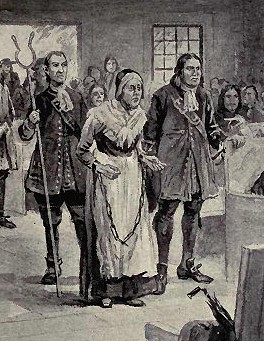Over 300 years ago, in America, more than 200 people were accused as practicing witchcraft in and around Salem in colonial Massachusetts. Twenty were executed.
I didn’t study the Salem witch trials until I learned that ten generations back, one of my husband’s ancestors had three sisters accused as witches and put in jail. Two of them were hung!
Back through Hattie (Kern) Kidney, the first white child born in Lee County, Illinois–whom Chief Sabona and his braves came to see in 1836, the braves climbing the trees to watch when the baby was brought outside. Hattie’s parents were James W. Kern (Civil War Co. A, 10th Reg. Minn. Vol. Inf.) and Caroline E. Town.
The Town[e] Family
Back through Russel Town (1789-1867), Revolutionary War soldier David Town (1762-1828), Edmund Town (1724-1779), and Ephraim Town (born 1688). Ephraim’s father–who eventually began to spell his last name without the “e”–was John Towne (1658-1740), a Selectman of Framingham, Massachusetts, later Town Clerk and Selectman of Oxford. John’s father was Ensign Jacob Towne, baptized in 1932 in England, married n 1657 in Salem, Massachusetts.
Jacob’s father was “Goodman William” Towne, born in Yarmouth, England in 1599, married there. He brought his wife and family–six children, from baby Mary to Rebecca, age fourteen–from England to the new world in 1672, settling at Salem. Two more children, including Sarah, were born at Salem.
William Towne died in 1672, twenty years before three of his daughters–Rebecca, Mary, and Sarah–were among those accused of witchcraft. Just who were these relatives of my husband’s family, and what could they have possibly done to even be accused of the “Devil’s magic,” to be hung for it?
Learning riveting details, while corresponding through the mail with contemporary cousins, always sent me to the public library–this time on a witch hunt.
I easily found their names–Rebecca Nurse, Mary Esty, and Sarah Cloyce–the Towne sisters. My husband descends from their brother, Jacob Towne.
Salem, Massachusetts
Rev. Samuel Parris moved to Salem Village in 1689 with his wife, daughter, niece, and two slaves. Even though their church preached against the occult, the two young girls, with the help of the slave Tituba began to experiment with spells. The girls began to moan and writhe. A doctor who eventually examined them decided they must be under a spell.
You can just imagine the gossip in a small town about the whole situation, involving the pastor’s own daughter and niece.
Churchmen decided to determine who had bewitched the girls and encouraged them to name their tormentors. Soon, other Salem girls were bewitched as well, accusing others in the community. There were already squabbles over land and other problems in the Massachusetts Bay Colony. Things got complicated, which you can read about in several histories about what happened. The hysteria eventually led to the deaths of twenty people!
The Towne Sisters
Indeed, two of the Towne sisters were hanged as witches–Rebecca that July 19, and Mary on September 22.

Rebecca (Towne) Nurse, the mother of eight children, was in her seventies. She was tried for witchcraft, found guilty, and hanged in Salem July 19, 1692.
Mary (Towne) Estey was in her fifties. She was found guilty and hanged September 22, 1692.
Sarah (Towne) Cloyes was in her forties. She was tried for witchcraft, but later released from prison.
Those tried for witchcraft and still imprisoned in May 1693 were pardoned, but the damage had been done. In 1697, a day of fasting and soul-searching for the tragedy was ordered. In 1711 the colony passed a bill restoring the rights and good names of those accused and granted restitution to their heirs. Massachusetts eventually formally apologized for the events–in 1957, more than 250 years later.


DAR Lineage Book; Topsfield, Mass. Vital Records; Towne Family History; Obituary of David R. Town; http://salem.lib.virginia.edu/people?group.num=&mbio.num=mb21
Boyer, Paul & Stephen Nissenbaum. Salem Possessed: The Social Origins of Witchcraft. (Cambridge, MA: Harvard U. Press, 1974)
Brown, David C. A Guide to the Salem Witchcraft Hysteria of 1692. (Havertown, PA: Casemate Academic, 1984)
Starkey, Marion L. The Devil in Massachusetts: A Modern Enquiry Into the Salem Witch Trials. (NY: Doubleday, 1949)
Also YA: Ann Rinaldi’s A Break With Charity: A Story about the Salem Witchcraft Trials.
I wrote a report on the Salem witch trials in Jr. High and I have always found this period fascinating! I still have my report 🙂 My Knowlton ancestors were in Ipswich and the area at the time – and I know there are Knowlton testimonies at the trials. A quick google showed that maybe they testified at the Nurse and Estey trials! I’m most likely related to, but probably not directly from, these Knowltons. One day I’m going to dig a little deeper into this one!!!
Wow! I should have done more with this, such as delving into the “politics” between the families, but at least got this much done. Having someone in your family line “involved” sure gets you into history, doesn’t it? I didn’t like history in high school, and avoided it in college.
I also descend from Jacob Towne.
I’d love for you to delve deeper into this history 🙂 would love to read more on it. Great timely post! Sharon
I descend from Jacob also. Tragic story. Does make the story much more personal. I understand that the Jacob’s mother Joanna Blessing Nurse was also accused.
I agree. Just a tragic chapter in our shared history.
I am also a descendant of jacob Towne. Very sad history
I wouldn’t have read about what happened except that a relative sent the connection. Yes, very sad history.
The Towne family surely spread their seed! I am descendant of Isaac Easty/Esty (spelling lost through generations), Mary Esty’s husband. I believe he was also accused.
Thank you for your note. You still carry the name!